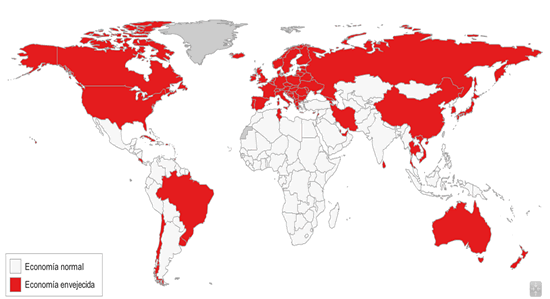Latin America Is Experiencing an Irreversible Process
of Population Ageing
Photo: Tinnyaw, Flickr
Despite differences among countries, Latin America and the Caribbean is experiencing an irreversible process of population ageing, with major implications for governments and society in general. This is demonstrated by analysing economic indicators from an age perspective (according to the various age groups that make up the population).
This approach of examining the economic life cycle of various generations is at the heart of the National Transfer Accounts (NTA) project coordinated by the Latin American and Caribbean Demographic Centre (CELADE) - Population Division of ECLAC, with the support of the International Development Research Centre (IDRC) of Canada and the University of California, Berkeley (United States), as part of a worldwide project led by Professors Ronald Lee and Andrew Mason.
This new perspective examines economic relations among groups in a national economy: young people and older adults, rich and poor, men and women. For the first time, it is possible to observe all economic flows among such groups: either through the market (the labour or financial market), the State (through tax and benefits), or the family (through transfers within and between households).
Unequal consumption among these groups can be measured, and the roles played by the market, State and family in maintaining inequality can be assessed. Applying the same framework to many countries makes it possible to draw international comparisons of this inequality by age, socio-economic status and gender.
According to figures from household surveys on income, spending, assets, work force and transfers, as well as the national accounts of 10 of the region's participating countries, Latin America and the Caribbean is experiencing a period of dramatic population changes, with major repercussions on the structure of economies and the economic relations between age groups.
Although the ageing of economies is a recent phenomenon, in the medium term it will become the defining feature in most of the world's countries. An economy is defined as aged when consumption of people aged 65 and above exceeds that of children and adolescents (aged 0 to 19). The analysis of NTAs enables the consumption of both age groups to be estimated and projected.
Based on the data from the worldwide project, by 2040 there are expected to be 73 aged economies in the world, including Brazil, Uruguay, Chile, Costa Rica and Cuba. This has major economic and fiscal implications, including a massive surge in health spending and increased pressure of government budgets.
During the recent 5th Congress of the Latin American Population Association (ALAP) held in Montevideo (Uruguay) from 23 to 26 October 2012, experts from CELADE, IDRC and the University of Berkeley organized a session on ageing, inequality and gender in Latin America and the Caribbean (as part of the NTA project).
The event included presentations from various members of national project teams and a large audience of relevant researchers. The experts presented preliminary studies on incorporating the gender perspective and outlined the main areas of work for the future, particularly in terms of the region's ageing population and the economic and fiscal challenges, inclusion of equality targets based on NTA estimates and studies on forthcoming determining factors of socio-economic and gender inequality in the region.
Map of aged economies by 2040

Source: CELADE-ECLAC Population Division, using database from the NTA project.
More IN FOCUS
Gender Institutions and Public Policies, Advances and Setbacks in Latin
America
The Importance of Raúl Prebisch in the 21st Century
| Latin America and the Caribbean is experiencing a period of dramatic population changes, with major repercussions on the age structure of the population. | |
| In a recent workshop held in Montevideo (Uruguay), experts analysed incorporating the gender perspective in countries' national accounts. |
|
